深圳牛津英语九年级chapter4基础知识复习讲与练
Unit4重点知识清单(含语法梳理it形式主语和形式宾语)牛津深圳版英语九年级下册

1.【melt v.(使)融化、熔化,融入,软化】→v. ~s, melted, ~ing→melter n.熔化器;熔炼工2.【flood v.淹没n. 洪水】→v. ~s, flooded, ~ing →flooded adj.洪水淹没的3.【badly adv.严重地;厉害地;恶劣地】→bad adj.坏的→比:worse, worst4.【coach n.教练;长途汽车;旅客车厢;四轮大马车v.训练;指导】→pl. coaches →v. coaches, ~ed, ~ing5.【pass v.&n.通过;及格;传递】→v. passes, ~ed, ~ing→passer n.旅客;过路人;合格者6.【dead adj.不转动的;无生命的;死亡的】→deadly adj.致命的;非常的→die v.死亡;消失→v. ~s, died, dying →death n.死亡→dying adj.临终的;垂死的7.【boss n.老板】→pl. bosses8.【stare v.凝视;盯着看】→v. ~s, stared, staring9.【notice v.注意到;通知n.通知;告示】→pl. ~s →v. ~s, noticed, noticing10.【awake v.(使)醒来adj.醒着的】→v. ~s, awoke/awoken, awaking11.【immediately adv.立刻;马上】→immediate adj.立刻的;紧迫的12.【missing adj.失踪的;缺少的】→miss v.漏掉;错过;想念n.小姐→v. misses, ~ed, ~ing →n.pl. misses13.【fellow n.小伙子;家伙adj.同类的;同伴的】→n.pl. fellows14.【sit v.坐下;使坐下】→v. ~s, sat/sat, sitting15.【seat n.座位v.使就座】→n.pl. ~s →v. ~s, ~ed, ~ing16.【fall v.落下;掉落;减少;下降n.瀑布;秋天】→v. ~s, fell/fallen, ~ing →n.pl. ~s17.【survival n.幸存;幸存者;生存】→survive v.幸存语法要点:【it 作形式主语、形式宾语】1.【it 作形式主语】→It’s difficult for a foreigner to learn Chinese. 【It is +adj. (+for sb) to do sth.】→It was foolish of him to give up the job. 【It is +adj.+of sb +to do sth.】→It’s a pity to miss such an important lecture.【It is +a pity/a shame/a fact/an honor/no wonder+to do sth.】→It seems/appears that he has caught a cold.→It’s reported that three people were badly hurt. 【It is +v.过分(said, believed, ...) +that从句】→It took us three days to plete the speech. 【It takes sb +时间+to do sth.】→It’s time have breakfast.=It’s time for breakfast. 【It is time (for sb) to do sth./It is time for sth.】→It’s two years since he lived in Shenzhen. 【It is +时间段+since从句(过去式)】2.【it 作形式宾语:v.(think, believe, find, consider, suppose, regard) +it+adj./n.+ to to /that从句】→Our teacher makes it a rule never to talk in class. 我们老师立下一个规矩,课上不讲话。
深圳牛津版九年级chapter1--chapter4期末复习
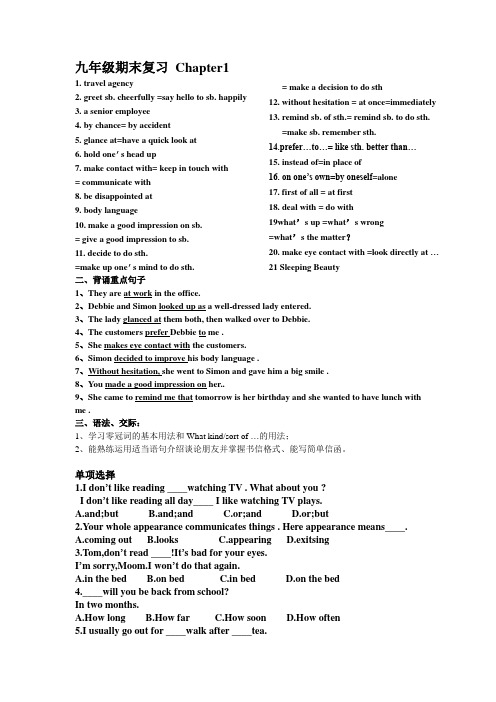
九年级期末复习 Chapter11. travel agency2. greet sb. cheerfully =say hello to sb. happily3. a senior employee4. by chance= by accident5. glance at=have a quick look at6. hold one ’s head up7. make contact with= keep in touch with = communicate with 8. be disappointed at 9. body language10. make a good impression on sb. = give a good impression to sb. 11. decide to do sth.=make up one ’s mind to do sth. 二、背诵重点句子1、They are at work in the office.2、Debbie and Simon looked up as a well-dressed lady entered.3、The lady glanced at them both, then walked over to Debbie.4、The customers prefer Debbie to me .5、She makes eye contact with the customers.6、Simon decided to improve his body language .7、Without hesitation, she went to Simon and gave him a big smile . 8、You made a good impression on her..9、She came to remind me that tomorrow is her birthday and she wanted to have lunch with me .三、语法、交际:1、学习零冠词的基本用法和What kind/sort of …的用法;2、能熟练运用适当语句介绍谈论朋友并掌握书信格式、能写简单信函。
深圳牛津英语九年级chapter4基础知识复习讲与练

9AB Chapter4基础知识复习讲与练一.例题解析:1. I gave her a note to pay for a bottle of water.A. 100 yuanB. 100 yuansC. 100-yuanD. 100-yuans解析:数词和名词构成复合形容词时,一般中间要加连字符,且都要用单数形式, 在句中作定语。
例如:an eight-hundred-word composition.一篇八百字的作文,a five-year-old girl 一个五岁的女孩a seven-minute journey 一次七分钟的旅程若不是复合形容词,则只能做表语。
如:five years old. 故答案为:C.2. He 5 yuan for the book.A. spentB. costC. paidD. took解析:表示花费时间和金钱的动词有spend、cost、take、pay. 但它们各自的句型搭配不同,要特别它们之间可以进行同义句转换:如:我花了十元钱买这本书。
I spent ten yuan on /(in) buying the book. = It took me ten yuan to buy the book.= The book cost me ten yuan. = I paid ten yuan for the book.如:昨天我花了两个小时写作业。
I spent two hours on /(in) doing my homework last night.=It took me two hours to do my homework last night. 故答案应为:C.3. She was afraid talk to the police.A. too; toB. to; tooC. so; thatD. so; to解析:too…to…意思是:太…而不能…例如:She is too young to go to school. 她年龄太小,不能上学。
牛津深圳版英语九年级上册unit 4《problems and advice》优秀教案4(重点资料).doc

10
10
第三环节 课堂练习
StepⅢPlay a game.
3.Work in group, choose a lucky number and answer some questions to get points. (Some questions are what kinds of sentencesstructure they are. Some should be make a sentence according to the instruction. Some should be easy enough to write the five simple sentence structure.)
教学难点
The usage of the five basic simple sentences.
教学关键
The usage of the five basic simple sentences.
教法与学法指导
group work, self study
教学环节
主要教学步骤或内容
学生主体活动
教师活动
⑥Read the sentences on P55- 56 loudly
2. Ask students to analyze the passage
①find all the sentence structure in the passage.
②Write down the technical terms
a.S+V
b.S+V+O
c.S+V+IO+DO
深圳牛津版初中英语九级上册Unit4知识点语法

深圳牛津版初中英语九级上册Unit4知识点语法Unit 4 Problems and advice1. online adj. 在线的;在网上 adv. 在线;在网上This online article is very interesting. 这篇在线文章很有趣。
2. model n. 模特儿Sally is going to be a model because she thinks she is good-looking.Sally自以为相貌出众,所以想当模特。
提示:model还有以下的含义:a. (依照实物按比例制成的)模型。
a model planeb. 样式;设计;型。
The latest model will be on display at the car show.c. 模范;典型 a model student3. diet n. 规定饮食(为健康或减肥等目的)I’ve only lost two pounds si nce I started this diet.从这次节食开始到现在我只减了2磅。
4. though conj. 虽然;尽管Aunt Anna likes Tim though he often annoys her.5. awful adj. 很坏的;极讨厌的 ---awfully adv. 非常;极其The weather last summer was awful. 去年夏季天气很糟糕。
There’s an awful smell in here.6. regret v. 懊悔提示:regret的常见用法有:A. regret+名词/代词eg: She immediately regretted her decision.B. regret+that/wh-从句 eg:I regret that I was unable to accept your kind invitation.I deeply regret what I said.C. regret +动词不定式,表示“很遗憾地做某事”eg: I regret tosay you failed the exam.D. regret +动名词,意为“后悔做了某事”,表示对已经发生的事情感到后悔。
牛津深圳版英语九年级上册Unit4基础知识讲解+练习题(含答案)

牛津深圳版英语九年级上册Unit 4 : Problems and advice I. Words and phrases:II. Key points of vocabulary:1.online adj. 在线的反义词 off-line You can chat to other people who are online. diet n. 规定饮食(be) on a diet 节食2.regret v. 懊悔同义词 be sorry forregret doing sth regret (that)I now regret leaving school so young.He was beginning to regret that he'd come alone.3.though conj. 虽然, 尽管同义词 although though 可放在句首或句中,不能与but 连用Though she's almost 40, she still plans to compete.Tom kept himself in though he was very angry.4.ashamed adj. 惭愧;羞愧feel ashamed of/at be ashamed to do sth ashamed thatI felt ashamed of the things I'd said to him.I'm ashamed to admit it.I'm ashamed that I haven't replied to your letter yet.5.mad adj. 很生气;气愤 especially angrydrive sb. mad 让某人受不了 mad at sb mad about sth go/get mad We get mad at each other sometimes.There's no need to get mad about it!Look at this mess! Mum will go mad!Her behaviour drives me mad.6.mess n. 杂乱;不整洁messy adj. 杂乱的;不整洁的make a mess 搞得一塌糊涂The house was a _______________ The house was _______________ When I got home, the house was a complete _______________7.annoying adj. 使恼怒的;使生气的annoyed adj. 恼怒的, 气恼的annoy v. 使生气, 惹恼类似构词:interest -interesting-interested surprise-surprising-surprisedfrighten-frightening-frightened excite-exciting-excited8.out of place 格格不入I felt out of place at the birthday party.hear from 收到某人的信件同义词 get/receive a letter from9.none pron. 没有一个;毫无She waited for a reply, but none came.Even an old car is better than none.None of my friends phone me any more.none/no one区别:none:一般用来回答how many +n, how much +n 及含any+n引起的疑问句no one:回答who,及含anyone,anybody引起的疑问句 none of one's business 与某人无关10.careless adj. 粗心造成的反义词 careful11.fail v. 不及格;失败反义词 succeed failure n. 失败 success fail to do sth12.request n. 要求;请求v. 要求;请求13.hate v. 厌恶;憎恶同义词 dislike 反义词love14.polite adj. 有礼貌的反义词 impolite/rude politely adv. politeness n.15.exam n. 考试同义词 examination / test pass/fail an examugh at 嘲笑;讥笑同义词 make fun of17.advantage n. 优势反义词 disadvantageIII. key points of Reading:1. We saw a lady lying in the streetsee sb. doing sth. 看到某人正在做某事see sb. do sth 看到某人做过(经常做)某事 I saw the little girl crying in the park. _______________________________________The old man saw the man play with the cat. _____________________________________________ lie (撒谎) lied lied lying(躺) lay lain lying拓展:hear/notice/watch和see有相同的用法2. It was awful of them to laugh at her,and I regret not saying anything.It is +adj+of sb + to do sth.=sb. is adj. to do sth.They were awful to laugh at her.regret doing sth. 后悔/内疚做过某事 regret to do sth 遗憾地去做某事I regret to tell you that you can't pass the examination ___________________________________3.... it was a mistake for my mother to make me wear these ugly braces.It is +adj+for sb + to do sth.=To do sth is adj for sb.To make me wear these ugly braces was a mistake for my mother. __________________________________ make sb do sth . 使某人做某事wear 穿(戴)着[表状态];put on 穿上[表动作] dress 打扮[后接人]4. She has a habit of playing the piano ... studying,and she always takes my things without telling me. have a habit of doing sth 有做某事的习惯The Smiths have a habit of going out for a walk after dinner. ______________________________________ take one's thing without telling sth 未经允许就拿走某人的东西Little Tom took his classmate's ruler without telling him. _________________________________________5.I try to keep the room tidy,but....try to do sth 尽力做某事try doing sth 尝试做某事You must try to be more careful. _________________________________I tried gardening but didn't succeed. ____________________________________keep sth adj 保持某物某种状态keep sb doing 使某人持续做某事Please keep the window open/closed. ___________________________He kept the little girl laughing. ____________________________Unit 4 : Problems and advice 课后练习一、英汉互译。
Unit4知识点巩固牛津深圳版英语九年级上册
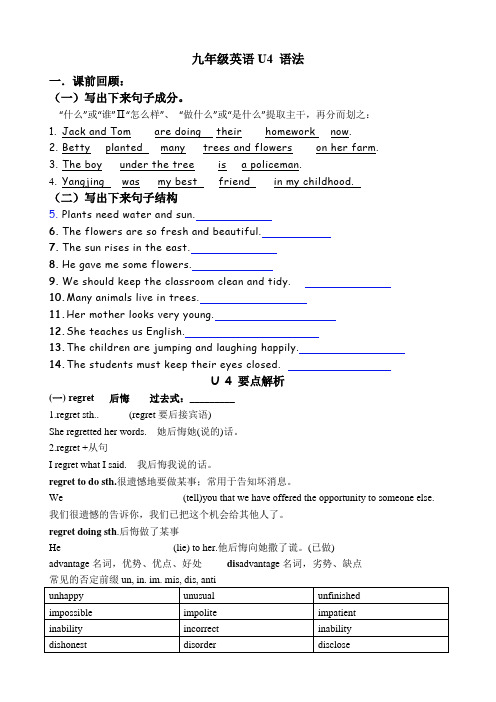
九年级英语U4 语法一.课前回顾:(一)写出下来句子成分。
“什么”或“谁”Ⅱ“怎么样”、“做什么”或“是什么”提取主干,再分而划之:1.Jack and Tom are doing their homework now.2.Betty planted many trees and flowers on her farm.3.The boy under the tree is a policeman.4.Yangjing was my best friend in my childhood.(二)写出下来句子结构5.Plants need water and sun.6.The flowers are so fresh and beautiful.7.The sun rises in the east.8.He gave me some flowers.9.We should keep the classroom clean and tidy.10.Many animals live in trees.11.Her mother looks very young.12.She teaches us English.13.The children are jumping and laughing happily.14.The students must keep their eyes closed.U 4 要点解析(一)regret 后悔过去式:_________1.regret sth.. (regret要后接宾语)She regretted her words. 她后悔她(说的)话。
2.regret +从句I regret what I said. 我后悔我说的话。
regret to do sth.很遗憾地要做某事;常用于告知坏消息。
We________ _______ ________(tell)you that we have offered the opportunity to someone else. 我们很遗憾的告诉你,我们已把这个机会给其他人了。
深圳牛津版初中英语九年级下册Unit4知识点语法精讲精练【全套4】
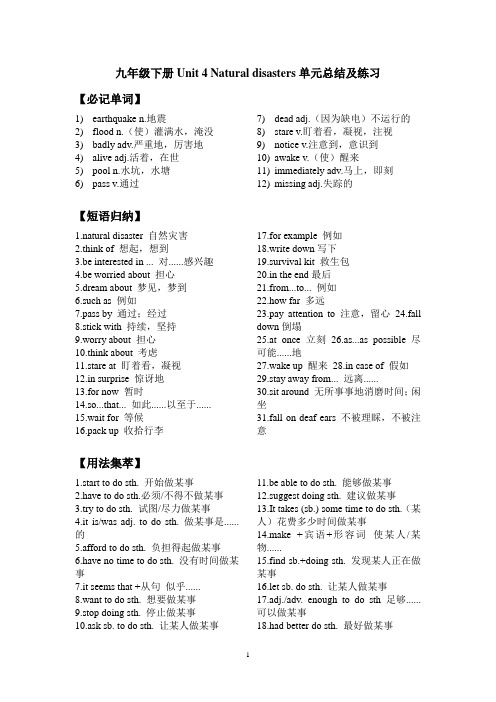
九年级下册Unit 4 Natural disasters单元总结及练习【必记单词】1)earthquake n.地震2)flood n.(使)灌满水,淹没3)badly adv.严重地,厉害地4)alive adj.活着,在世5)pool n.水坑,水塘6)pass v.通过7)dead adj.(因为缺电)不运行的8)stare v.盯着看,凝视,注视9)notice v.注意到,意识到10)awake v.(使)醒来11)immediately adv.马上,即刻12)missing adj.失踪的【短语归纳】1.natural disaster 自然灾害2.think of 想起,想到3.be interested in ... 对......感兴趣4.be worried about 担心5.dream about 梦见,梦到6.such as 例如7.pass by 通过;经过8.stick with 持续,坚持9.worry about 担心10.think about 考虑11.stare at 盯着看,凝视12.in surprise 惊讶地13.for now 暂时14.so...that... 如此......以至于......15.wait for 等候16.pack up 收拾行李17.for example 例如18.write down写下19.survival kit 救生包20.in the end最后21.from...to... 例如22.how far 多远23.pay attention to 注意,留心24.fall down倒塌25.at once 立刻26.as...as possible 尽可能......地27.wake up 醒来28.in case of 假如29.stay away from... 远离......30.sit around 无所事事地消磨时间;闲坐31.fall on deaf ears 不被理睬,不被注意【用法集萃】1.start to do sth. 开始做某事2.have to do sth.必须/不得不做某事3.try to do sth. 试图/尽力做某事4.it is/was adj. to do sth. 做某事是......的5.afford to do sth. 负担得起做某事6.have no time to do sth. 没有时间做某事7.it seems that +从句似乎......8.want to do sth. 想要做某事9.stop doing sth. 停止做某事10.ask sb. to do sth. 让某人做某事11.be able to do sth. 能够做某事12.suggest doing sth. 建议做某事13.It takes (sb.) some time to do sth.(某人)花费多少时间做某事14.make +宾语+形容词使某人/某物......15.find sb.+doing sth. 发现某人正在做某事16.let sb. do sth. 让某人做某事17.adj./adv. enough to do sth 足够......可以做某事18.had better do sth. 最好做某事21.keep doing sth. 一直做某事19.help sb. (to) do sth. 帮助某人做某事20.expect sb. to do sth. 期待某人做某事【经典句型】1. It’s important to stick with it.坚持工作很重要。
牛津深圳版英语九年级上册unit 4《problems and advice》优秀教案5(重点资料).doc
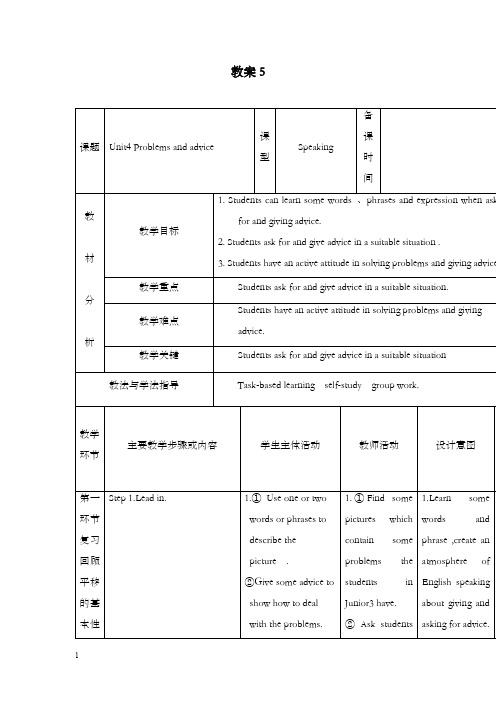
1.①Use one or two words or phrases to describe the picture .
②Give some advice to show how to deal with the problems.
③Give judgment
1.①Find some pictures which contain some problems the students in Junior3 have.
4More practice to improve the speaking ability.
Help them to learn with petition.
10
第五环节 课后作业
Step 5 Summary.
Listen to the teacher carefully.
Draw a conclusion.
②Give advice to deal with the problem
2.①Ask students to work in group and discuss to list the problems the students in Junior 3 have and write the down.
②Play again and fill in the blank for more detailed information.
③Mime the speakers in the recording
④Ask a pair or two of students to practice the recording in front of the classroom.
5
Unit4Problemsandadvice知识点讲解精选精练牛津深圳版英语九年级上册
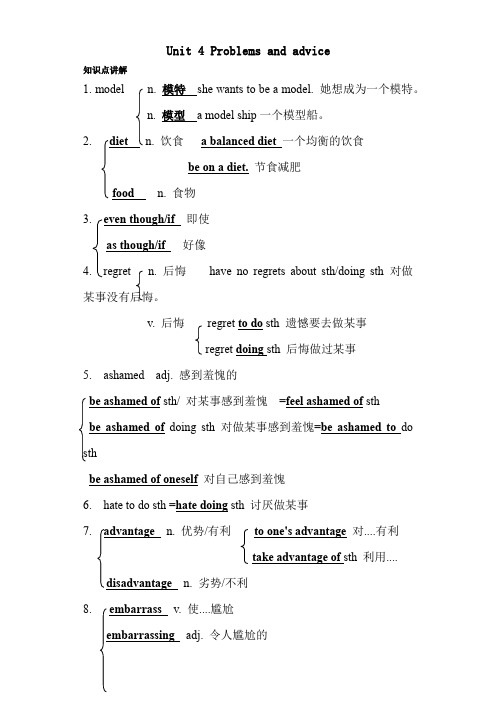
17.A.peopleB.people’sC.peoplesD.peoples’
18.A.a dayB.one dayC.one weekD.a week
19.A.atB.ofC.forD.to
fail to dosth未能做到某事
failuren.失败
24.carev/n照顾
carefuladj.小心的,仔细的
Hale Waihona Puke carelessadj.粗心的25.be sure todo sth一定去做某事
be sure of/aboutsth对...有把握
26.politeadj.有礼貌的
impoliteadj.不礼貌的
Don’t take your exams too seriously. Some students may think that the rest of their life13them. That’s not true. Instead, just regard the exams as another difficulty14you will overe. You have overe all kinds of difficulties in your life so far. You are15to overe the difficulty of the exams!
diseasen.疾病
15.keep v.保持keephealthy/fit保持健康
keepdoing sth坚持做某事
keepsb from doing sth阻止某人做某事
v.饲养keep cows on the farm在农场里养牛
牛津深圳版九年级上册 unit 4重点词汇知识梳理+巩固练习题
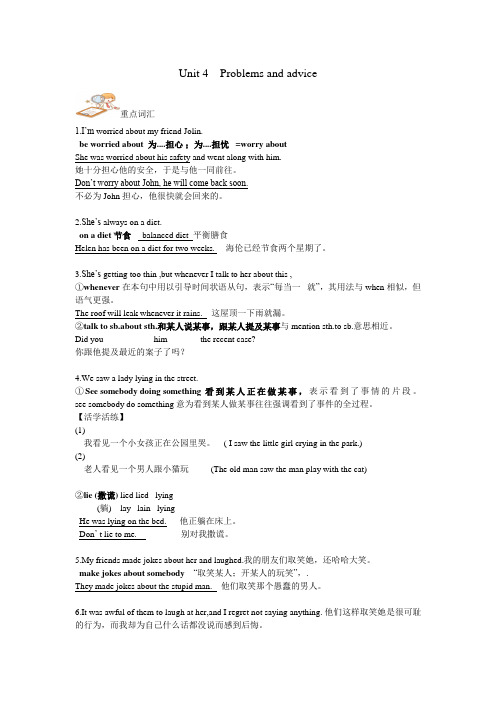
Unit 4 Problems and advice重点词汇1.I’m worried about my friend Jolin.be worried about 为....担心;为....担忧 =worry aboutShe was worried about his safety and went along with him.她十分担心他的安全,于是与他一同前往。
Don’t worry about John, he will come back soon.不必为John 担心,他很快就会回来的。
2.She’s always on a diet.on a diet 节食balanced diet 平衡膳食Helen has been on a diet for two weeks. 海伦已经节食两个星期了。
3.She’s getting too thin ,but whenever I talk to her about this ,①whenever在本句中用以引导时间状语从句,表示“每当一就”,其用法与when相似,但语气更强。
The roof will leak whenever it rains. 这屋顶一下雨就漏。
②talk to sb.about sth.和某人说某事,跟某人提及某事与mention sth.to sb.意思相近。
Did you _____ _____him _______the recent case?你跟他提及最近的案子了吗?4.We saw a lady lying in the street.①See somebody doing something 看到某人正在做某事,表示看到了事情的片段。
see somebody do something意为看到某人做某事往往强调看到了事件的全过程。
【活学活练】(1)_______________________________________我看见一个小女孩正在公园里哭。
Unit4知识点讲解及练习牛津译林版英语九年级上学期

9A Unit4 Growing up知识点梳理词性转换lead领导(v./n.)→leader领导者(n.)simple简单的(adj.)→simply简单地,仅仅(adv.)nation国家,民族(n.)→national国家的(adj.)success成功(n.)→successful成功的(adj.) successfully成功地(adv.) succeed成功(vi.)achieve实现,达成(vt.)→achievement成就(n.)survive幸存(vt.)→survivor幸存者(n.)usual寻常的(adj.)→unusual不同寻常的(adj.)die死亡(vi.)→dead死亡的(adj.) dying临死的(adj.) death死亡(n.)短语、句型归纳1.What’s on your mind? 你有什么心事?on one’s mind 挂在心上,惦念in one’s mind 在某人看来make up one’s mind 下定决心change one’s mind 改变主意2. Growing up is hard! 长大真难啊!3. What’s up?=What’s the matter?=What’s wrong? 怎么了?4. build another one for yourself 为你自己建造另一个(房屋)build sth. for sb. 为某人建造某物5.Don’t wake me up until you finish building it. 直到你造完(房屋)再叫醒我。
finish doing sth. 完成做某事6. allow me to learn about people in different times and places使我能了解不同时期和地方的人allow doing sth. 允许做某事7. read them whenever I want to 无论何时我想读就读他们8. learn about the world through the Internet 通过因特网了解世界9. As soon as you click t he mouse, there’s a great deal of information.你一点击鼠标,就会有大量信息。
牛津深圳九年级上册Unit 4 单元知识点复习-教育文档

九年级上册Unit 4 单元复习重点短语1. (be) on a diet 节食2. laugh at 嘲笑;讥笑3. feel ashamed of ... 对……感到惭愧4. drive sb mad 让某人受不了5. make a mess 搞得一塌糊涂*6. be worried about ... 担心……*7. a group of ... 一群……*8. make jokes about sb 拿某人开玩笑*9. have a habit of doing sth 有做某事的习惯*10. keep ... tidy 保持……整洁*11. have a fight with sb 与某人打架/争吵*12. feel sorry about doing sth对做某事感到遗憾/内疚*13. do some research 做调查*14. write to sb 写信给某人*15. lose weight 减肥*16. be full of ... 充满……*17. used to do sth 过去常常做某事*18. be afraid of ... 害怕……*19. arrive at ... 到达……*20. make sure 确保1. out of place 格格不入2. none of one’s business 与某人无关3. hear from收到某人的信件(或电子邮件、电话等)*4. by accident 意外地;偶然地*5. care about 关心;在乎*6. not ... at all 一点也不;完全不*7. shout at ... 朝……喊叫*8. be surprised to do ... 很吃惊做……*9. be polite to ... 对……有礼貌*10. thanks for doing sth 对做某事表示感谢*11. in ... situation 在……的情况/ 处境*12. worry about ... 担心……*13. make up one’s mind 下定决心*14. pay attention to ... 注意……*15. stop doing sth 停止做某事U4语法梳理句子成分观察下列例句的各个句子成分。
深圳牛津版初中英语九年级上册Unit4 Family life知识点语法精讲精练
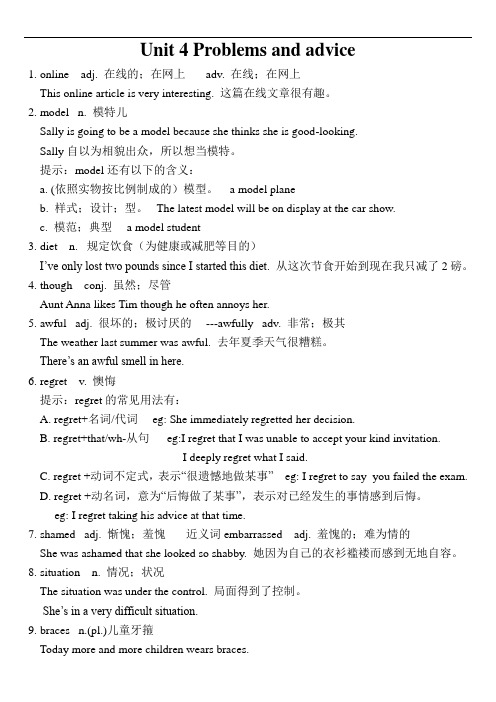
Unit 4 Problems and advice1. online adj. 在线的;在网上 adv. 在线;在网上This online article is very interesting. 这篇在线文章很有趣。
2. model n. 模特儿Sally is going to be a model because she thinks she is good-looking.Sally自以为相貌出众,所以想当模特。
提示:model还有以下的含义:a. (依照实物按比例制成的)模型。
a model planeb. 样式;设计;型。
The latest model will be on display at the car show.c. 模范;典型 a model student3. diet n. 规定饮食(为健康或减肥等目的)I’ve only lost two pounds since I started this diet.从这次节食开始到现在我只减了2磅。
4. though conj. 虽然;尽管Aunt Anna likes Tim though he often annoys her.5. awful adj. 很坏的;极讨厌的 ---awfully adv. 非常;极其The weather last summer was awful. 去年夏季天气很糟糕。
There’s an awful smell in here.6. regret v. 懊悔提示:regret的常见用法有:A. regret+名词/代词 eg: She immediately regretted her decision.B. regret+that/wh-从句 eg:I regret that I was unable to accept your kind invitation.I deeply regret what I said.C. regret +动词不定式,表示“很遗憾地做某事”eg: I regret to say you failed the exam.D. regret +动名词,意为“后悔做了某事”,表示对已经发生的事情感到后悔。
初三英语Chapter4 Fishing with birds Language and writi
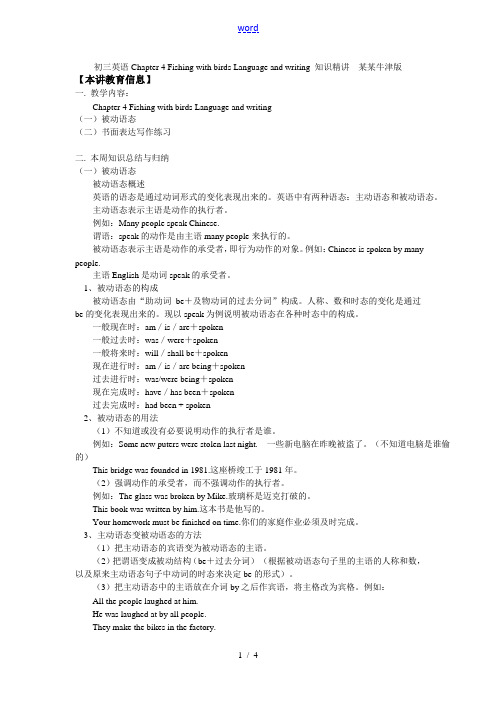
初三英语Chapter 4 Fishing with birds Language and writing 知识精讲某某牛津版【本讲教育信息】一. 教学内容:Chapter 4 Fishing with birds Language and writing(一)被动语态(二)书面表达写作练习二. 本周知识总结与归纳(一)被动语态被动语态概述英语的语态是通过动词形式的变化表现出来的。
英语中有两种语态:主动语态和被动语态。
主动语态表示主语是动作的执行者。
例如:Many people speak Chinese.谓语:speak的动作是由主语many people来执行的。
被动语态表示主语是动作的承受者,即行为动作的对象。
例如:Chinese is spoken by many people.主语English是动词speak的承受者。
1、被动语态的构成被动语态由“助动词be+及物动词的过去分词”构成。
人称、数和时态的变化是通过be的变化表现出来的。
现以speak为例说明被动语态在各种时态中的构成。
一般现在时:am/is/are+spoken一般过去时:was/were+spoken一般将来时:will/shall be+spoken现在进行时:am/is/are being+spoken过去进行时:was/were being+spoken现在完成时:have/has been+spoken过去完成时:had been + spoken2、被动语态的用法(1)不知道或没有必要说明动作的执行者是谁。
例如:Some new puters were stolen last night.一些新电脑在昨晚被盗了。
(不知道电脑是谁偷的)This bridge was founded in 1981.这座桥竣工于1981年。
(2)强调动作的承受者,而不强调动作的执行者。
例如:The glass was broken by Mike.玻璃杯是迈克打破的。
- 1、下载文档前请自行甄别文档内容的完整性,平台不提供额外的编辑、内容补充、找答案等附加服务。
- 2、"仅部分预览"的文档,不可在线预览部分如存在完整性等问题,可反馈申请退款(可完整预览的文档不适用该条件!)。
- 3、如文档侵犯您的权益,请联系客服反馈,我们会尽快为您处理(人工客服工作时间:9:00-18:30)。
9AB Chapter4基础知识复习讲与练一.例题解析:1. I gave her a note to pay for a bottle of water.A. 100 yuanB. 100 yuansC. 100-yuanD. 100-yuans解析:数词和名词构成复合形容词时,一般中间要加连字符,且都要用单数形式, 在句中作定语。
例如:an eight-hundred-word composition.一篇八百字的作文,a five-year-old girl 一个五岁的女孩a seven-minute journey 一次七分钟的旅程若不是复合形容词,则只能做表语。
如:five years old. 故答案为:C.2. He 5 yuan for the book.A. spentB. costC. paidD. took解析:表示花费时间和金钱的动词有spend、cost、take、pay. 但它们各自的句型搭配不同,要特别它们之间可以进行同义句转换:如:我花了十元钱买这本书。
I spent ten yuan on /(in) buying the book. = It took me ten yuan to buy the book.= The book cost me ten yuan. = I paid ten yuan for the book.如:昨天我花了两个小时写作业。
I spent two hours on /(in) doing my homework last night.=It took me two hours to do my homework last night. 故答案应为:C.3. She was afraid talk to the police.A. too; toB. to; tooC. so; thatD. so; to解析:too…to…意思是:太…而不能…例如:She is too young to go to school. 她年龄太小,不能上学。
这个句型还可以用not + adj./adv. + enough to do sth. 或者是so +adj./adv. + that否定从句的结构来表转换。
She is not old enough to go to school. / She is so young that she can’t go to school.故答案应为:A.4.I don’t know how him .A. helpB. helpingC. is helpD. to help解析:句子的结构为“疑问词+ 动词不定式”,如:what (not) to do / how to do it/ where to go/ what to do with/ how to deal with it这种特殊的动词不定式短语,可在句中可做作主语、宾语和表语。
例如:(1)How to improve my body language is very important.(2)They didn’t know which one to choose.(3)The question is where to find the girls.“疑问词+接动词不定式”作宾语时可以转换成宾语从句。
特别注意,从句须用陈述语序,即:主+谓+宾语。
I feel guilty and don’t know what to do. 我感到很内疚,不知道该怎么办。
= I feel guilty and don’t know what I should do. 故答案为:D.5. In the old days, many people have no houses ________.A. to liveB. live inC. to live forD. to live in解析:不定式作定语如果是不及物动词,或者不定式所修饰的名词或代词是不定式动作的地点、工具等,不定式后面需加相应的介词。
例如:(1)There is nothing to worried about. 没有什么好担心的。
(2)He needs a pen to write with.他需要一支笔写字。
故答案为:D.6. I made the decision the money.A. keepB. to keepC. keepingD. kept解析:make a decision to do sth. 意思是决定做某事,可用make up one’s mind to do sth. 或decide to do sth. 来转换。
故答案为:B.7. No one was hurt, ___________ ?A was heB was itC were theyD weren’t they解析: 此题考查学生反意疑问句的用法,当主句的主语是不定代词表示人且表否定的时候,后面的反意疑问句应用肯定的复数,若为物体的时候,则用单数形式。
E.g. Nothing was on the desk, was it ? 故答案为:C.8. I _____________ this city for three years.A have gone toB have been toC have been inD have been at解析: have gone to 经去了某地(人未回来)have been to 曾经到过某地(人已回来)have been in 到某地来多久(表延续)eg. (1)---Where is Mum? 妈妈在哪呢?---She has gone to HongKong.她去香港了。
(2)I have been to HongKong twice. 我曾经去过香港两次。
(3)They have been in HongKong for ten years. 他们在香港呆了十年了。
故答案为:C9.He is ________ that we all like him.A so honest a boyB such honest an boyC so an honest boyD such a honest boy解析: 此题考查so 和such 的用法。
So + adj. + a/an + 可数名词单数,such + a/an +adj. +可数名词单数。
有些词只能与so连用,如:so many/much/few/little . such 只能用来修饰名词,如such beautiful flowers(此时的只能用such 不能用so) 故答案为:A10. He was made __________ there so long.A standB to standC standingD stood解析:此题考查学生使役动词在被动语态中的用法,在主动语态中make后用动词原形,make sb do sth. 变成被动态为be made to do sth. 此类动词还有let 和have.。
当感官动词后加动词原形的时候和次用法相同eg. be seen to enter 故答案为:B11. My grandfather stays at home ________.A himB by oneselfC alongD on his own解析:此题考查学生独自一人做某事的表达法。
alone adv. (=by yourself; on one’s own, with no other people)单独;独自例如(1)She lived alone. 她独居。
(2)He did it all alone. 这事是他一个人干的。
(3)Are you travelling alone? 你独自一人旅行吗?alone adj. (只作表语)单独的, 独自的; 独一无二的。
例如(4)He was alone in the house. 他独自一人在家里。
(5)I am not alone in thinking so. 并非只有我才这样想的lonely adj. 孤独的,寂寞的例如(6)He doesn't feel lonely when he is left alone.在只剩下他一个的时候, 他并不感到孤独。
故答案为:D.12 . He saw Lucy the teacher’s office .A. to come intoB. come inC. enterD. to enter解析:此题考查感官动词后接动词原see sb. do sth.类似的动词有:watch, hear make, let,,have 等其次辨析come in, come into, entercome in 是“进来”,come into/go into 与enter 的意思相同,都表示“进入”,come into/go into具有方向性,而enter则不具有方向性。
且enter后不能与into等任何介词连用。
故答案是: C13、He got off the bus and ________ home.A walked toB walkedC to walkD went to解析:此题主要考查地点副词home的用法。
它前面不能用介词,因此只能用walk home /go home (回家),on one’s way home在某人回家的路上,stay at home呆在家,take sth. home 把某物带回家等。
类似的词还有there, 如get there (去那儿)答案为: B.14、He was late _______ it rained heavily.A becauseB because ofC forD that解析:because 后须接原因状语从句,而because of 后须接名词或名词词组来表原因。
我们常用他们进行同义句转换。
如:He was late because he was ill.= He was late because of his illness. (注意because不能与so连用), 而for表示由事情推断出的原因。
故答案为:A15、What about _________ to the park.A goB to goC goingD to going解析:此题主要考What about/ How about doing sth.来提出建议,常用的句型还有Let’s do sth. / Why not do sth.? / Shall we do sth? 在解释句子中,此四种可互换。
